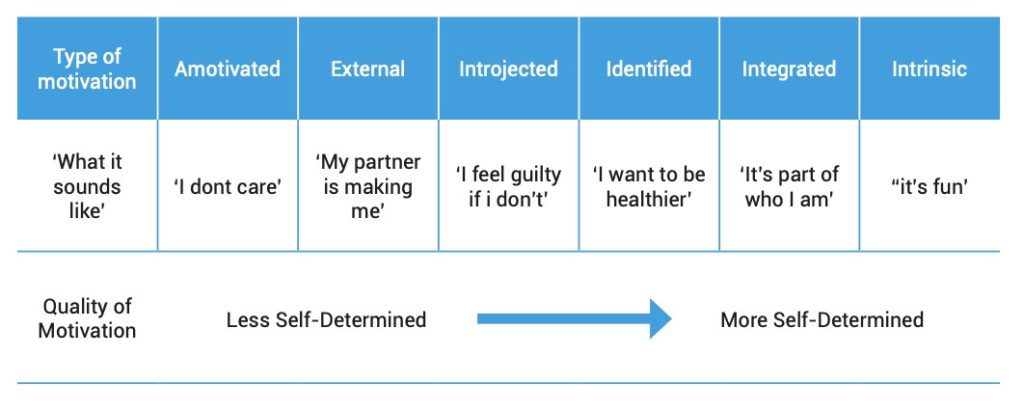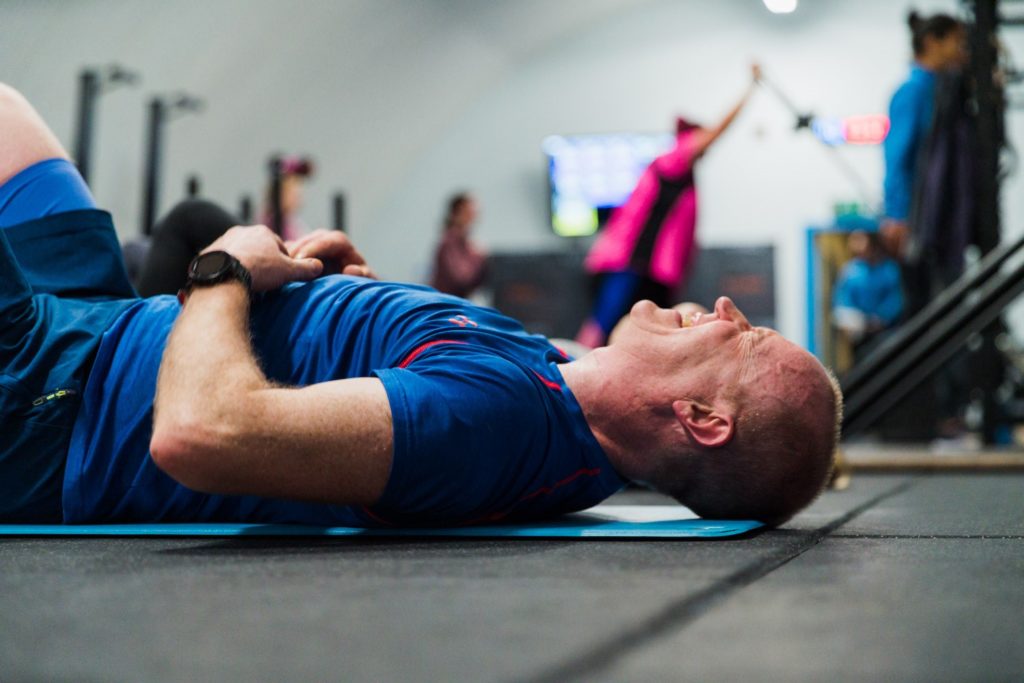The Motivation Mistake: 3 Reasons it Runs Out & What to do About It
I need a kick up the backside.
That’s something we often hear when people first come to AKR.
Or – I just can’t stay motivated.
If that’s you, you’re not alone. Motivation is a common challenge when it comes to health and fitness.
Here we share 3 reasons why that might be the case and what you can do about it.
1. You Rely on the “Wrong” Type of Motivation
Ok, there is no “wrong” motivation. If something gets you moving, great!
But… there are different types of motivation. And not all are equal. If you find that motivation never seems to last, it could be that you tend to use lower quality forms of motivation.

The Continuum of Motivation
External motivation is when you’re motivated by something outside of yourself. You take action only to gain a reward or to avoid punishment.
An example is when you take up exercise because you have a holiday coming up. It works. But only while the punishment or reward is present. You feel motivated to get in shape …until the holiday. No holiday? No exercise!
Another downside to this type of motivation is that it feels controlling. You might book a 10k to motivate yourself to do some more running. Soon though, you find yourself running – not because you want to – but because you have to. Again, you’re only running because of the external goal. And you might find that you’re left with even less motivation to run after the event passes!

Can I stop running now?
For longer lasting results, you’d be wise to look at the opposite end of the continuum. The highest form of motivation doesn’t actually feel like motivation at all. You do something because you love to do it. It’s fun!
For most of my life, football was just that. I didn’t need any prompting or encouragement. I didn’t need to be coerced or persuaded or nagged. Football was fun.
Let’s be realistic though. There are many things in life you that must be done that don’t always feel like fun. And exercise might just be one of them!

Exercise: Not always “fun”?
There are of course ways to make exercising more fun – like exercising in a friendly environment and amongst peers. For now, though, let’s consider other forms of intrinsic motivation.
Identified motivation can be thought of as making a vote for the type of person you want to be. An external goal might be in the picture here, but rather than it being about the goal itself, you’re fueled more by how you see yourself.
Back to the running example, you go out running, not solely because you have an event to train for, but because something about running is important to you. You might not love every run, but you want to be a good runner, so you put your shoes on and get moving.
Integrated motivation is when the activity is tied to your values and your identity. You are a runner. Runners run. It’s just who you are. This is where I got to with football. As a kid, it was fun. Eventually it became part of my identity. Nobody needed to motivate me to turn up to football training. Football was who I was and what I did.

Do you see yourself as the type of person who exercises?
If you’re caught in start-stop fitness cycles, stop looking for things outside of yourself to fire yourself up. You’ve done the new diet and the new health kick. You’ve picked countless arbitrary milestones over the years – the wedding, the holiday, the 10k, the significant birthday. They don’t last.
Instead, try looking at the higher end of the motivational continuum. Consider making a vote for the person you want to be. Consider how exercising consistently would support your values. Consider your identity – are you the type of person who looks after their health, or not? And look for ways to make health & fitness fun.
2. You’re Too Optimistic
Optimism is healthy. Too often in fitness though, your optimism is just another way to feel better right now. …And fail again tomorrow.
Picture the scene: It’s Sunday night. You’ve eaten a lot over the weekend. You feel full and heavy and uncomfortable in your clothes. Enough is enough. You vow to change.
Starting tomorrow you’re taking up running. You look ahead on your calendar. There’s a social event in 6 weeks-time. Yes! You’ll run every morning before work and will be feeling fantastic for the event.
Optimism roars. It feels good to be taking action, to have a plan. Your Sunday night woes make way for excitement.
Here we go!
…Except that, you didn’t actually do anything. And you don’t actually have a plan. It’s False Hope Syndrome and the only thing your unrealistic expectations do is make your Sunday night a little better.
Running every morning sounds like a great plan, but don’t you have an early meeting on a Thursday? Isn’t the forecast for wind and rain later in the week?
The key is to be realistic. Most people unwittingly make their plans based on an ideal world. A smarter approach would be to plan for the worst case – the least motivated, most stressed-out version of yourself.
Rather than get blinded by the optimism of a new “plan”, try actually making a plan. What are the potential obstacles? If problem X or Y comes up, how would you overcome it? The clarity of a realistic and flexible plan is highly motivational.

Clarity is motivational. Do you have a realistic and flexible plan?
3. You Overlook the Day-to-Day
Ok, let’s say you found your intrinsic motivation to run. You created a realistic plan based on the worst version of yourself. You enjoy running and feel motivated to do it consistently.
You feel it’s time to run that marathon. You picture the crowds cheering you on. You picture yourself crossing the finish line, greeted by your family and friends. Feeling utterly spent but reveling in a huge sense of accomplishment.
What you don’t picture is the training. Hours pounding the streets. Alone. In the darkness. The niggly injuries along the way.
Everybody wants to be the person who has completed a marathon.
Nobody wants to train for a marathon!
Ok, that may or may not be the case. But this isn’t about running. It’s about recognising that despite the world selling us stories of overnight success and life-changing epiphanies, achievement tends to be built on the mundane.
Whether it’s running, weight training, building your savings or learning to eat better, it’s about practising the basics day-to-day for a long time.
When this sinks in, it can catch you out. The goal is sexy but the path isn’t. Motivation can suffer. Consider in advance:
- What does the day-to-day look like?
- What are the basics that you’ll have to commit to over and over again?
- How can you make the pain & monotony more meaningful and enjoyable?
At AKR, for instance, we specialise in small group personal training. Our motivational environment makes exercise fun and, for some, it is a social experience. We take care of the training programme and guide you through every movement. So there’s no pain of knowing what to do or if it works. The programme changes and evolves with time to keep things fresh and interesting and we have a variety of ways for you to track your progress should you choose to.

Clarity, coaching & community makes the day-to-day more fun.
Summary
If you want lasting motivation, quit trying to fire yourself up with external goals. Instead, look at how you can enjoy the activity for its own sake. Look at how the activity can serve your values and how it fits your identity. Are you the type of person who exercises consistently, or not? If not, are you happy with where that path takes you?
It’s easy to show up on the good days but we don’t live in an ideal world. Obstacles challenge motivation. Clarity reinforces it. Make your plans for the worst version of yourself.
Lastly, consider the day-to-day. Although the big steps are inspiring, it’s the day that, make your life. What are you signing up for and how can you make it meaningful and enjoyable enough to keep showing up?
Always Keep Reaching!
Mike




Sam maxwell
Posted at 06:28h, 13 NovemberWay to show contempt for your paying members a “kick in the back” first line
make a gym that’s casual then blame the customer
Mike MacDonald
Posted at 08:16h, 13 NovemberYou seem quite triggered by the article, Sam. Did you actually read it, or did you just skim through the headings?
Motivation is a common challenge for people. It’s not a question of “blame”.
All we’re doing here is diving deeper into that challenge and sharing some solutions to help people experience a more lasting form of motivation.
It works too. In a recent survey of our members 96% say they’ve been more motivated to workout out since joining AKR.